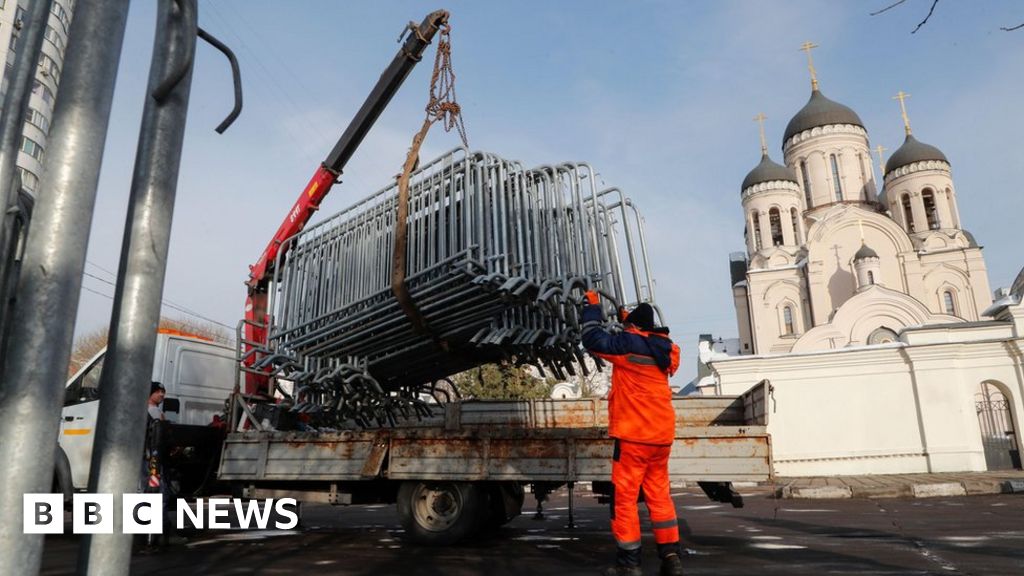Fences were lowered near the church where Navalny's memorial service will be held on Friday.
With hours left until Alexei Navalny's funeral, his team said it continues to face difficulties in organizing the memorial service.
His spokeswoman Kira Yarmis said a hearse could not be found to transport the body to the church.
“Unknown people are calling the morgue and threatening to collect Alexei's body,” Yarmysh said.
His funeral will be held on the outskirts of Moscow on Friday, two weeks after he died in an Arctic prison.
On Wednesday, the team announced that a memorial service would be held at 14:00 Moscow time (11:00 GMT) at Marino's Church of the Icon of Our Lady of Sorrow.
The burial will then take place at 4pm at the nearby Borisovskoye cemetery.
The funeral will also be streamed online on Navalny's YouTube channel.
Navalny died on February 16 in a Russian prison in the Arctic Circle. He had been jailed for three years on trumped-up charges.
Navalny died on February 16 in his cell in a Siberian prison colony, where he was being held for a 19-year sentence on charges widely seen as politically motivated.
His team is encouraging people to participate and has shared a map of the route between the two locations.
It also shared a list of overseas locations where people can attend Navalny's memorial service, from Seoul to Rome to Montreal to Stockholm.
It is unclear how many people will attend his funeral in Moscow on Friday.
Leonid Volkov, Mr Navalny's former chief of staff, said in an interview with BBC Newshour that he was concerned about what would happen during his assignment in Moscow.
“I'm afraid that we're expecting a surprise tomorrow…Frankly, as we speak now, I don't know if people will actually be allowed to say goodbye to Alexei.” he said.
He added that Navalny's team was also concerned that there would be problems in the churches where services are held.
In March 2015, thousands of people lined the streets to mourn murdered opposition politician Boris Nemtsov, but similar public outpourings of grief for President Vladimir Putin's opponents are rare. , is currently unlikely to be recognized.
In recent years, Russian authorities have cracked down on any behavior that could be interpreted as criticizing the government. Efforts to commemorate Navalny's death were met with a heavy-handed response, with makeshift memorials removed and hundreds of people arrested.
Photos circulating on social media on Thursday afternoon showed a heavy presence of police near both the church where the memorial service will be held and the cemetery where Navalny will be buried, waiting for fencing to be erected. It was reflected.
Telegram channel LasNews also reported that surveillance cameras had been installed on “all streetlights” surrounding the cemetery.
First Department, a group of lawyers and human rights activists, shared advice on social media for those planning to attend Navalny's funeral.
The newspaper warned of “pro-government activists” acting as provocateurs and called on the public to remain vigilant. “The possibility of detention after the ceremony cannot be ruled out… Try to avoid being seen by the security forces, do not use public transport or apply for paperwork in administrative offices” days after the funeral. ”
The recommendations include not carrying any items bearing Navalny's photo or the symbol of his anti-corruption foundation, which has been labeled an extremist organization by Russian authorities.
It is unclear who in Navalny's family will be able to attend the funeral other than his mother Lyudmila, who recently publicly accused authorities of not preserving her son's body.
Navalny's children Dalia, 23, and Zakhar, 15, live abroad.
His widow, Yulia, is not believed to currently live in Russia, due to her work with Navalny's team and her recent public declaration that Russian President Vladimir Putin was to blame for her husband's death. If they return home, they may be at risk of arrest.
For several days, authorities reportedly tried to block attempts by Navalny's team to organize a public farewell ceremony for him as opposition leader.
Yarmysh said on Tuesday that Navalny's team was having trouble finding a place to hold the ceremony. Some funeral homes claimed to be fully booked, while others told them they were “prohibited” from working with them.
Navalny's widow, Yulia, said in a speech on Wednesday that she did not know whether the funeral would be held peacefully or whether police would arrest those who came to say goodbye.


